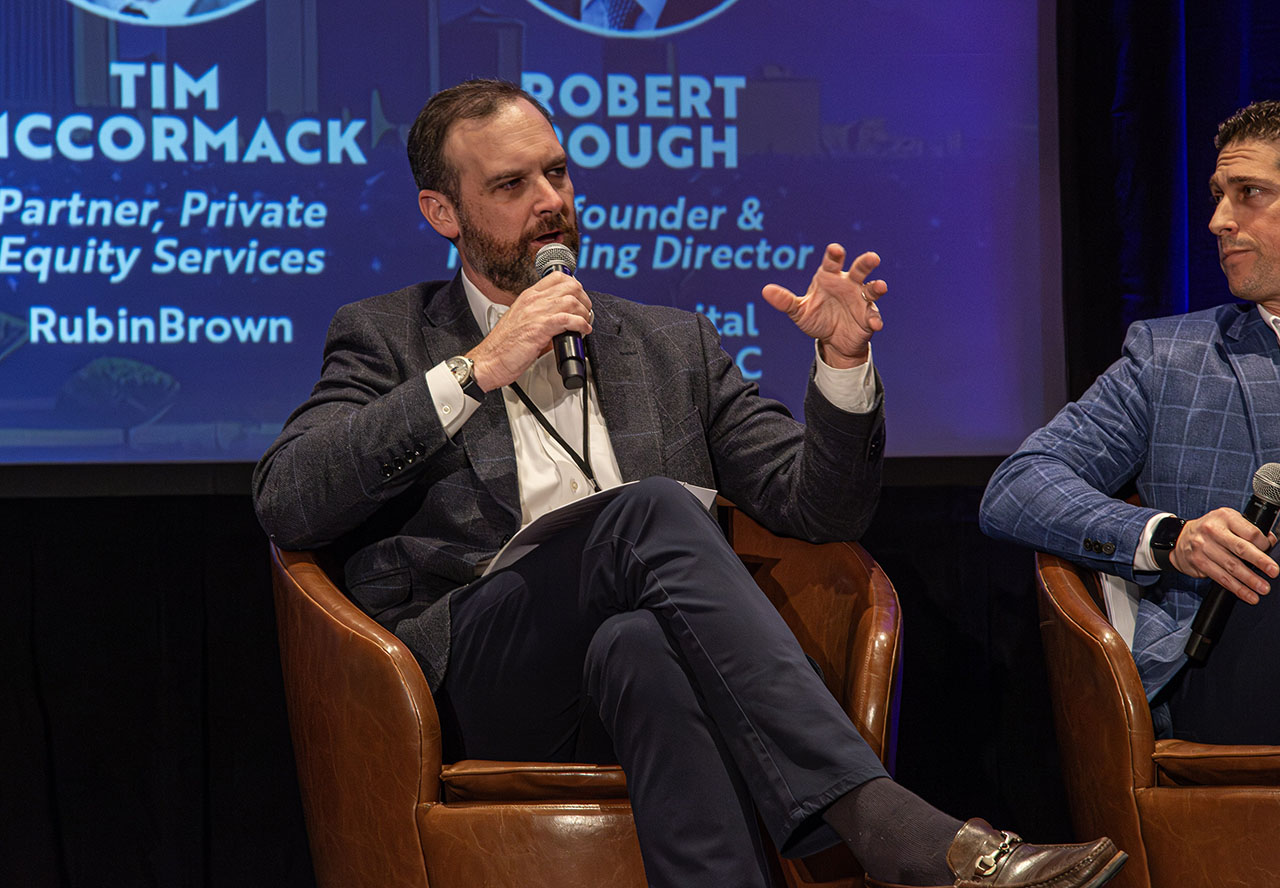During the recent AM&AA 2025 Winter Conference, a panel of experts gathered to present a session titled, “Accelerating Success: Proven Strategies to Shorten Deal Timelines.”
Moderated by Lamar Stanley, Director with Highland Rim Capital, panelists Bobby Kingsbury, Managing Director with MCM Capital Partners; Tim McCormack, Partner, Private Equity Services with RubinBrown; and Robert Rough, Managing Director with Telos Capital Advisors explained how speed is often the difference between a successful deal and a missed opportunity. The panel of experienced dealmakers presented a number of actionable strategies that reduce the time from initial engagement to closing. From streamlining due diligence and fostering communication, to leveraging technology and optimizing negotiation processes, the panel shared their insight on how to overcome common delays and ensure faster, more efficient transactions.
“I did a little research and depending on what industry or part of the middle market you’re talking about, deal timelines from around 2010 until now have been elongated from IOI [Indication of Interest] to close, from anywhere from 40% to 80%,” said Standley in his opening comments. “Directionally, no matter where you are in our end of the market, it is taking longer to get deals closed.”
Additional issues brought forth by the panel for elongated times to close deals were that data is now more readily available to research, deeper due diligence was being conducted by prospective buyers, and market instability.
“I definitely think when you’re in a period of economic uncertainty or going into a period of economic uncertainty, that’s going to cause buyers to be a lot more cautious and make sure they really have a full understanding of what they’re getting into before they move forward,” said McCormack. “Think about the last 18-24 months in terms of the quality of assets that are coming to market… it’s a lot more of your B and C class of assets probably now than you had in late 2021/early 2022.”
And with volumes of financial data now readily available, the panel was asked how this data is properly sifted through in order to pursue closing a deal in a timely fashion.
“I think the sell-side quality of earnings provides the sell-side advisory and opportunity and that seller to not have the buyer potentially re-trade,” noted Kingsbury. “It doesn’t give us a leg to stand on where there’s that sell-side diligence that’s done upfront. As a firm that loves to stand by what we put on paper and stand behind it, oftentimes we are losing to folks who are bidding higher.”
In discussing some additional bottlenecks during the sale process than time that slow things down, Kingsbury cited third-party consent.
Rough added, “I think one of the things that takes a long time is throwing documents back and forth via e-mail. The buy-side puts together the initial draft of the purchase agreement, emails it to the sell-side attorney, and they take a week and make their comments, and then goes back. If you want to speed up a deal, tell your sell-side attorney that they get one look at the draft, mark it up, and you are going to send it back, and then we are going to all get together in a room and hash it out, because that is the way we used to do it, and that is the way it used to get done.”
“People that don’t have any skin in the game, from a landlord, customer, supplier, sometimes even a shareholder that really is not involved in the business where you need to get their signature,” he explained. “I don’t know if any of you have ever tried to negotiate with an irrational human being… it is the most frustrating thing in the world! There is no sense of logic that you can rationalize with them. But third-party consents in my experience, the sooner that you can get them done and complete or at least broach the subject, oftentimes with a customer, supplier, are the types of things that should be done as soon as possible.”
The topic shifted to ensuring efficient, clear communication throughout the sale process and how disagreements can slow deals down or cause frustration.
“I like to say communication sets expectations, but clear communication manages expectations,” said Kingsbury.
McCormack added, “I’d say e-mail is not the answer for good communication. So to the extent you are shooting one-off questions, or are trying to check everything through a chain of emails over the last several weeks… it is almost guaranteed that something is going to get lost in that e-mail chain with 20 different people on it responding to different threads and all that type of stuff.”
And while e-mail was not highly suggested as a means of communication in the sale process, the panel shifted the discussion to other means of technology that could hasten deals in today’s marketplace.
“Technology has definitely changed the way that we’re doing diligence on deals on both buy-side and sell-side,” explained McCormack. “We’ve got tools now where we can extract what we need from certain systems almost instantly, and save days or sometimes weeks of time on our team depending on the complexity. We can pull out monthly trial balances, cash flow statements, AR [accounts receivable], AP [accounts payable] agings, general ledgers, all almost instantly and have it pre-populated into a full diligence data book, which then our team can hit the ground running, and really speed up the process for the work that we’re doing. Those tools have helped a lot in helping us be more efficient.”
Whether an advisor, investment banker, or private equity professional, the practical techniques provided in the “Accelerating Success: Proven Strategies to Shorten Deal Timelines” can assist with closing deals more quickly, and properly capitalizing on opportunities in today’s marketplace.







